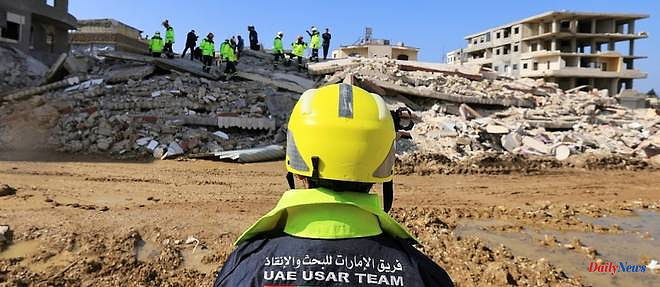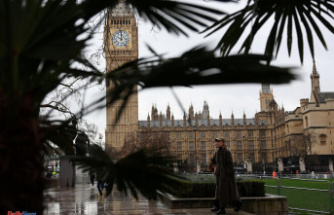“No more hope,” says the head of the Civil Defense of Jableh. A heavy silence hangs over this quake-devastated town in northwestern Syria, where rescuers have been struggling for nearly a week to find survivors.
Several hours have passed since the last rescue, when two people were pulled from the rubble by under-equipped rescue workers.
"Despite everything, with each step, we stop and shout: is there anyone alive?" continues Alaa Mubarak, while a tracker dog sniffs around a destroyed building.
The dog roams the area for half an hour. Then he trots off again, without barking: there are no more survivors.
Like this Saturday, this scene unfolds almost daily in Jableh, where hope of saving lives is fading.
Of the 52 inhabitants of this five-story building, only 14 came out alive.
Among them, a woman and her young son were pulled from the rubble on Friday before a cheering crowd, who hoped to see other survivors. The woman died while being transported to hospital.
The Mediterranean coastal city of Jableh is located in Latakia province, a regime stronghold hard hit by the earthquake that struck Turkey and Syria on February 6.
The earthquake killed more than 28,000 people, including more than 3,500 in Syria, mainly in the north.
In the province of Latakia alone, at least 638 people have been killed, according to authorities.
The tracker dog was brought in by a team of 42 rescuers who arrived from the United Arab Emirates on Friday, equipped with advanced search cameras, sensors and fuel tanks.
The Syrian, Lebanese and Iranian teams must make do with derisory means, often digging with their hands or shovels.
"We haven't received new equipment for twelve years, 90% of our stock is out of order," says Mr. Mubarak. "If we had this kind of equipment, we would have saved hundreds of lives, if not more."
Ravaged by twelve years of civil war, Syria lacks basic resources, let alone search and rescue equipment.
The province of Latakia, spared from hostilities because of its loyalty to the Damascus government, is no exception.
Fuel shortages and chronic power cuts force international rescue teams to work with their own equipment.
At the foot of another destroyed building, about 500 meters away, an engineering engineer who works for the Ministry of Defense also testified, without giving his name because he is not authorized to speak to the media: "Our work can mainly be described as manual work".
In the densely populated neighborhoods of Jableh, hundreds of onlookers crowd around the rescue teams to try to obtain information on those still missing.
Some watch from window sills and seem so close to the ruins that they could reach out and pick up the debris.
Sniffer dogs often dash in their direction, identifying them as the closest living people.
On the sidewalk, Mohammad al-Hamadi watches rescue workers digging into what was once his home, now reduced to shreds of concrete.
The 23-year-old young man, injured in the right leg in the earthquake, is the only survivor of his family.
His parents and his brother were killed. "The building collapsed on our heads. I was completely buried," he says, adding that only his finger managed to pass through the pieces of concrete. "They had to grab my finger to lift me up."
Nearby, Colonel Hamad al-Kaabi, the head of the Emirati rescue workers, says the chances of finding survivors have become so slim that emergency teams have been allowed to use excavators and heavy machinery to clear the rubble.
“Most of the survivors have already been removed,” he explains, hoping despite everything. "There is still a chance of finding survivors."
02/12/2023 13:06:23 - Jableh (Syria) (AFP) - © 2023 AFP












